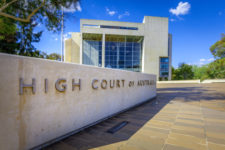High Court Challenge Launched Against NSW Police Powers

Three men accused by police of being Rebels Motorcycle Club members – Damien Vella, Johnny Vella and Michael Fetui – have launched legal proceedings in the High Court of Australia against an application by the Commissioner of Police (NSW) under section 5 of the Crimes (Serous Crime Prevention Orders) Act 2016 (the SCPO Act) to restrain them for a period of two years from:
(a) approaching, contacting or associating directly or indirectly with certain persons;
(b) travelling in a vehicle between 9pm to 6am, except in case of a genuine medical emergency;
(c) attending or approaching certain specified premises; and
(d) possessing more than one mobile telephone or possessing or having access to certain communications devices or applications.
Among other things, lawyers for the men are seeking an order from the High Court that “subsection 5(1) of the SCPO Act… [is] invalid (in whole or in part) because it is inconsistent with and prohibited by Chapter III of the Constitution”.
In their written submissions to the Court, they point out that their clients were acquitted of the charges upon which the Commissioner relies as the basis for the sought orders, and argue that the powers contained in section 5 of the SCPO Act are so broad and the threshold test for ‘serious crime related activity’ so low that they cannot be considered:
“ “appropriate” to achieve the stated purpose of protecting the public “by preventing, restricting or disrupting involvement by the person in serious crime related activities” which is a requirement of Chapter III of the Commonwealth Constitution (the chapter dealing with the powers of the judiciary and courts).
They point to the fact that a person does not need to be charged with – let alone found guilty of – a criminal offence to come under the control provisions of the Act, and that the relevant section:
“(a) undermines the criminal justice system of the State courts;
(b) requires or enlists the relevant courts in administering a different and lesser grade of criminal justice, doing so at the discretion of the Executive; and
(c) departs from traditional judicial functions, methods and procedures to such a degree as to substantially undermine the relevant courts’ institutional integrity.”
They submit that section 5 “confers a non-judicial power on the Supreme Court and District Court, the scheme of which undermines the criminal justice system and the principle of finality of litigation” and thereby “substantially impairs the Supreme and District Court’s institutional integrity.”
They apply on those grounds for the section to be declared invalid in full or, alternatively, in part.
2016 – A big year for the erosion of freedoms in NSW
The NSW Parliament enacted the subject Crimes (Serious Crime Prevention Orders) Act in 2016.
It was one of four major pieces of NSW legislation passed that year which significantly increase the powers of police at the expense of the civil liberties of citizens – the others being the Criminal Legislation Amendment (Organised Crime and Public Safety) Act, which empowers police to exclude particular persons (or classes of persons) from public events, areas or premises if police feel they pose a ‘serious risk to public safety or security’, the Inclosed Lands, Crimes and Law Enforcement Legislation Amendment (Interference) Act, which is part of the state’s suite of anti-protest laws, giving police the power to issue directions to move on to anyone they deem a ‘safety risk’ (which is a term not defined by the legislation and charge them with a crime if they fail to comply, and the Terrorism (Police Powers) Amendment (Investigative Detention) Act, which permits the extended detention of children as young as 14 if police claim to suspect them of terrorism.
These Acts give police broad ranging powers to control citizens, often with little or no judicial oversight, making police officers the ‘judges, jurors and executioners’ in many situations.
The laws built upon years of legislation eroding legal protections and safeguards in our state, and the virtually absence of public dissent emboldened the state government to pass many more freedom-eroding laws since.
Serious crime prevention orders
Section 5 of the SCPO Act provides that an ‘eligible applicant’ – which means the Commissioner of Police, the DPP or the Crime Commission – can apply to an ‘appropriate court’ – meaning the court where an adult has been convicted of a ‘serious criminal offence’ (which covers a broad range of offences) or, in the case of any other ‘serious crime related activity’, the Supreme Court – for an order restricting or otherwise controlling the person’s movements, actions and/or associations if ‘the court is satisfied that there are reasonable grounds to believe that the making of the order would protect the public by preventing, restricting or disrupting involvement by the person in serious crime related activities’.
‘serious crime related activity’ is broadly defined as anything done by a person that is or was at the time a serious criminal offence, whether or not:
(a) the person has been charged with the offence, or
(b) if charged, the person:
(i) has been tried, or
(ii) has been tried and acquitted, or
(iii) has been convicted (even if the conviction has been quashed or set aside).
At the time they were proposed, the laws came under fire by the legal profession and civil liberties groups on the basis that they allow police to target and control individuals in “an extraordinarily wide range of circumstances”.
Those concerns largely fell on deaf ears, with the laws being passed quickly, with little public consultation and with almost-immediate bipartisan support.
The determination of their validity is now in the hands of the highest court in the land.






